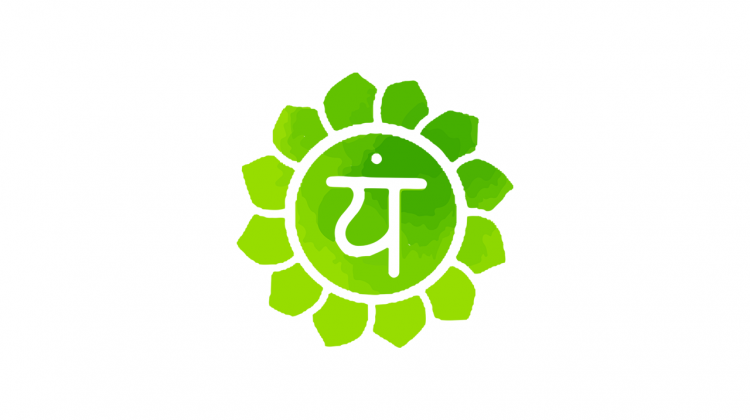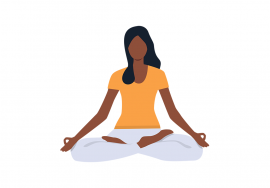
ANAHATA/HRIDAYA CHAKRA SHUDDHI – PURIFYING THE HEART CENTRE
According to Yogic philosophy, there are 7 main chakras (energy centres) within our bodies, namely Mooladhar (root) chakra, Svadishthan (sacral) chakra, Manipur chakra (solar plexus), Anahata (heart) chakra, VishuddhI (throat) chakra, Ajna/Agya (third eye) chakra and Sahasrara (crown) chakra.
There are also 7,272,210 nadis (energy channels) in our bodies, out of which 72,000 are very important. Out of these, 14 are more significant, and of these 14, there are 3 which are the most prominent.
There are 2 main categories of these nadis, one is called “pranavaha nadis” and the other is called “manovaha nadis”. Through pranavaha nadis, mainly the prana vayu (life force) and other types of air element flows, whereas through manovaha nadis, our “Chit/Chetana” (consciousness/mental energy) flows.
The pranavaha and manovaha nadis are all interconnected with regard to their influence on each other. It is mentioned in Yogic & Ayurvedic texts – “Chaley vaatey chalam chitam; Chaley chita chalam vatam” – meaning that the flow of “Vata” (Prana Vayu or life force) affects the direction in which the mind goes. Similarly, wherever our attention/consciousness goes, energy or prana flows towards that subject matter or object. As it is commonly said in English, “energy flows where attention goes”…..
The heart chakra (Anahata Chakra) is traditionally seen as the link/bridge between the physical and subtle realms. This chakra enables us to give and receive love, experience joy, inner peace, kindness, compassion, security, etc.
Imbalance or weakness of the heart chakra often manifests in negative symptoms like depression/ anxiety, inability to forgive/let go of pain & hurt, needing to be accepted by others, dependence on others for fulfilment, jealousy, harsh judgement of other people, a lowered/compromised immune system, heart palpitations, poor circulation, high/low blood pressure, respiratory and breathing difficulties, etc.
Ayurveda says it is imperative to keep our heart chakra pure in order to have purity of consciousness and thoughts – without achieving this state, our actions cannot be right/appropriate, and this can bring us unwanted adverse reactions.
In the Yogic system of healing, there is a very simple technique called “Namaskar Mudra Asana”, which is recommended to purify (detoxify) our heart chakra. The technique is as follows:
Technique:
- Stand straight on a yoga mat/cotton towel/rug keeping your feet together.
- Bend your elbows, join your palms and place your joined palms on the middle of the chest in such a way that the tips of your thumbs can touch the cavity of the throat.
- Keep your fingers and thumbs together.
- Put firm pressure on the middle of the chest from the base of the thumbs while focusing on the third eye chakra, keeping your eyes closed.
- Breathe normally.
- Maintain this position until your mind is in full concentration and your body remains still – initially your body will sway sideways, back & forth, and once the mind is controlled/focused, the body will become still and steady.
Timings: it is best to do this in the morning before starting the yoga asana practice, especially before doing meditation, and at night before going to bed, to induce good sleep.
Benefits:
- This simple posture helps to bring the mind under the control of one’s will. Generally, energy flows downward through all the nadis, which makes one’s mind become attracted and distracted towards the outside world and sense objects. This can have a very depleting and exhausting effect on one’s body and mind.
- When firm pressure is put on the middle of the chest, where the Anahata (heart) chakra is located, it helps to check the downward flow of Manovaha nadis, which helps to conserve mental energy by establishing a proper connection amongst the mind, intelligence and consciousness.
- Due to this, the mind turns inward towards one’s own self, instead of running after the outside world and the many sense objects. This helps to conserve mental energy and to make one feel peaceful & undisturbed.
- Thus, this technique helps us purify not only the mind and the heart chakra but also all the senses and all the nadis (pranavaha and manovaha).
- When our energy is integrated, it helps us to feel more grounded and undisturbed by external factors/situations.
- You can experiment the very subtle and immediate effect of this simple and unique yogic technique by practicing it at night. While doing this pose, think of a particular time you need to get up the next morning and repeat that 3 times in your mind, then go to bed. Often, you will be surprised to experience that you wake up at that particular time the next morning, without any alarm, as if someone from within you is waking you up.
There are many more benefits (at the gross and subtle level) mentioned in ancient yogic texts, with elaborate explanations regarding why & how the benefits are achieved/experienced by practicing this simple yoga posture called “Namaskar Mudra Asana”.
“Namaste”, a gesture where both palms are folded together, is a common way of greeting each other in many cultures, particularly in Vedic culture. It is a very humbling gesture which is still practiced very widely amongst people of Indian origin and amongst those within the Yoga community and/or any spiritual organisation. This “Mudra” (gesture) is spontaneously done while greeting someone, while welcoming guests and while expressing respect towards elders, Gurus and teachers.
Why does this simple gesture of “Namaste” have such a sublime and deep effect on our minds & hearts?
According to Yogic and Ayurvedic philosophy, our fingers and thumbs represent the 5 universal elements. In particular, the thumbs represent the fire element, which corresponds to our ego/pride. So, when we place our joined palms with the base of the thumbs touching firmly on the area of the heart chakra, it checks the energy flow moving through the manovaha nadis, which curbs our ego/pride and invokes/awakens humility within our hearts.
From this little piece of information, we can get a glimpse of how deep and sublime ancient Vedic wisdom/science is……
To book an online appointment at Ayuryoga, with our Ayurveda/Yoga Expert Mr. Vinod Sharma Hong Kong please click here.








